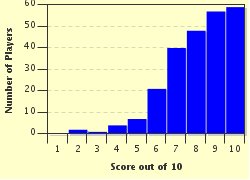Quiz Answer Key and Fun Facts
1. No developments in religious thought occurred during the dark ages.
2. Which king of England said: 'Who will rid me of this troublesome priest'?
3. For what offence was Galileo Galilei pursued by the Inquisition?
4. Louis XIV and his ministers issued the Revocation of the Edict of Nantes in 1685. What, specifically was being revoked?
5. What was the primary social (as opposed to theological) reason why Lollards were persecuted in medieval England?
6. Which of these were a series of events, initially instigated by the Papacy and senior clergy, dating from the late eleventh century to the thirteenth century?
7. From the sixteenth to the nineteenth centuries this 'trade' persisted. It took the efforts of well-meaning reformers much time to eradicate this trade. Please name it.
8. This happened in the twentieth century, in Western Europe, and was principally directed against young women. It was under the auspices of the church. Which of these events is it?
9. Possibly the darkest of all the activities of the Christian church, historically, has been in relation to which particular group?
10. This religious group was seen as a threat by the medieval church. The church therefore decided to eradicate the heresy and heretics. This was in the thirteenth century; who were they?
Source: Author
KATE211
This quiz was reviewed by FunTrivia editor
agony before going online.
Any errors found in FunTrivia content are routinely corrected through our feedback system.


